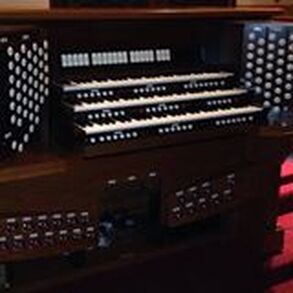Music Ministry
 Welcome!
Welcome!
Contact:
Heather Hall,
Director of Music
[email protected]
914.632.0673 (Rectory Phone Number)
724.880.3862 mobile phone
Roma Grogan,
Children's Choir Director
[email protected]
“Serve the Lord with gladness: come before his presence with singing.” - Ps.100
Heather Hall,
Director of Music
[email protected]
914.632.0673 (Rectory Phone Number)
724.880.3862 mobile phone
Roma Grogan,
Children's Choir Director
[email protected]
“Serve the Lord with gladness: come before his presence with singing.” - Ps.100
ADULT CHOIR REHEARSALS are on SUNDAYS from 10:00-10:45am in the Music Office (September through June). Men and women of all ages and abilities are welcome to join in preparing to lead the singing at the Sunday 11:00 am Masses as well as select other occasions during the church year including Holy Week, Christmas, and the annual Bereavement Mass.
CHILDREN'S CHOIR REHEARSALS are on Wednesdays from 4:00 to 4:45 pm in the Music Office (September through May). Children in grades 1-8 prepare to lead the singing at the Sunday 9:00 am Masses. Please join us!
Want to explore the Catechism of the Catholic Church regarding Liturgy?
http://www.vatican.va/archive/ccc_css/archive/catechism/p2s1c2a1.htm
especially #1140, #1156, #1176, and #1191
http://www.vatican.va/archive/ccc_css/archive/catechism/p2s1c2a1.htm
especially #1140, #1156, #1176, and #1191

Our parish is incredibly fortunate to have such an incredible Walker Digital organ to support the congregation in song. This beautiful investment will be a treasure to our church for many, many years to come. Did you ever wonder why the organ is so important in church? In the USCCB document Sing to the Lord, several reasons are given:
Among all other instruments which are suitable for divine worship, the organ is“accorded pride of place” because of its capacity to sustain the singing of a large gathered assembly, due to both its size and its ability to give “resonance to the fullness of human sentiments, from joy to sadness, from praise to lamentation.” Likewise, “the manifold possibilities of the organ in some way remind us of the immensity and the magnificence of God.”
In addition to its ability to lead and sustain congregational singing, the sound of the pipe organ is most suited for solo playing of sacred music in the Liturgy at appropriate moments. Pipe organs also play an important evangelical role in the Church’s outreach to the wider community in sacred concerts, music series, and other musical and cultural programs.
For all of these reasons, the place of the organ should be taken into account from the outset in the planning process for the building or renovation of churches. However, from the days when the Ark of the Covenant was accompanied in procession by cymbals, harps, lyres, and trumpets, God’s people have, in various periods, used a variety of musical instruments to sing his praise. Each of these instruments, born of the culture and the traditions of a particular people, has given voice to a wide variety of forms and styles through which Christ’s faithful continue to join their voices to his perfect song of praise upon the Cross. Many other instruments also enrich the celebration of the Liturgy, such as wind, stringed, or percussion instruments “according to longstanding local usage, provided they are truly apt for sacred use or can be rendered apt.”
Among all other instruments which are suitable for divine worship, the organ is“accorded pride of place” because of its capacity to sustain the singing of a large gathered assembly, due to both its size and its ability to give “resonance to the fullness of human sentiments, from joy to sadness, from praise to lamentation.” Likewise, “the manifold possibilities of the organ in some way remind us of the immensity and the magnificence of God.”
In addition to its ability to lead and sustain congregational singing, the sound of the pipe organ is most suited for solo playing of sacred music in the Liturgy at appropriate moments. Pipe organs also play an important evangelical role in the Church’s outreach to the wider community in sacred concerts, music series, and other musical and cultural programs.
For all of these reasons, the place of the organ should be taken into account from the outset in the planning process for the building or renovation of churches. However, from the days when the Ark of the Covenant was accompanied in procession by cymbals, harps, lyres, and trumpets, God’s people have, in various periods, used a variety of musical instruments to sing his praise. Each of these instruments, born of the culture and the traditions of a particular people, has given voice to a wide variety of forms and styles through which Christ’s faithful continue to join their voices to his perfect song of praise upon the Cross. Many other instruments also enrich the celebration of the Liturgy, such as wind, stringed, or percussion instruments “according to longstanding local usage, provided they are truly apt for sacred use or can be rendered apt.”
